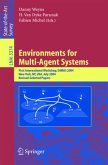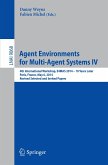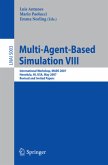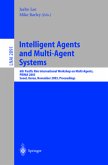Software intensive systems are increasingly expected to deal with changing user needs and dynamic operating conditions at run time. Examples are the need for life recon?gurations, management of resource variability, and dealing with p- ticular failure modes. Endowing systems with these kinds of capabilities poses severe challenges to software engineers and necessitates the development of new techniques, practices, and tools that build upon sound engineering principles. The ?eld of multi-agent systems focuses on the foundations and engineering of systems that consists of a network of autonomous entities (agents) that int- act to achieve the system goals. One line of research in multi-agent systems, inspired by biological, physical and other naturally occurring systems, concerns multi-agent systems in which agents share information and coordinate their - havior througha shared medium called an agentenvironment. Typical examples are gradient ?elds and digital pheromones that guide agents in their local c- text and as such facilitate the coordination of a community of agents. Since environment-mediation in multi-agent systems has shown to result in mana- able solutions with very adaptable qualities, it is a promising paradigm to deal with the increasing complexity and dynamism of distributed applications. Control in environment-mediated multi-agent systems is decentralized, i. e. , noneofthecomponentshasfullaccessorcontroloverthesystem. Self-organization isanapproachtoengineerdecentralized,distributedandresource-limitedsystems thatarecapableofdynamicallyadaptingtochangingconditionsandrequirements without external intervention. This useful system property is often re?ected in functionssuchasself-con?guration,self-optimization,andself-healing. Engine- ing approachesto self-organizing systems often rely on global functionality to emerge from localand autonomous decisions of individual agents that commu- catethroughasharedagentenvironment.
Hinweis: Dieser Artikel kann nur an eine deutsche Lieferadresse ausgeliefert werden.
Hinweis: Dieser Artikel kann nur an eine deutsche Lieferadresse ausgeliefert werden.








